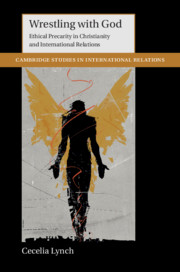Book contents
- Wrestling with God
- Cambridge Studies in International Relations: 152
- Wrestling with God
- Copyright page
- Dedication
- Contents
- Acknowledgments
- 1 Wrestling with God in the Modern West
- 2 Understanding Christian Wrestling about Ethics
- 3 Wrestling with the Violence of Conquest
- 4 Wrestling with War in a Modern World
- 5 Wrestling with the Violence of Oppression
- 6 Wrestling with Violence and Injustice Abroad and at Home
- 7 Has Anyone Prevailed?
- Bibliography
- Index
- Cambridge Studies in International Relations
7 - Has Anyone Prevailed?
Published online by Cambridge University Press: 02 March 2020
- Wrestling with God
- Cambridge Studies in International Relations: 152
- Wrestling with God
- Copyright page
- Dedication
- Contents
- Acknowledgments
- 1 Wrestling with God in the Modern West
- 2 Understanding Christian Wrestling about Ethics
- 3 Wrestling with the Violence of Conquest
- 4 Wrestling with War in a Modern World
- 5 Wrestling with the Violence of Oppression
- 6 Wrestling with Violence and Injustice Abroad and at Home
- 7 Has Anyone Prevailed?
- Bibliography
- Index
- Cambridge Studies in International Relations
Summary
I began this book by arguing that wrestling is the lifeblood of Christian ethics – in historical practice, if not in all Christian theology. Wrestling focuses our attention on the tensions regarding how Christians understand and define the common good, given their interpretation of religious teachings and practices for their sociopolitical context. Wrestling begs the question of what must be done, and what is possible, though Christians (like secularists and those who adhere to other religions) often assume the qualifier “in our world; by us.” Wrestling is part of popular casuistry – it is how people make sense of their ethical commitments to act in the world, given their interpretation of their sociopolitical context and their ideas about what the common good should be. In the Christian ethical genealogy presented in this book, the contextual nature of the common good also shapes conceptions of evil and sin, providing the foundation for Christian ethical wrestling about what to do and how to act. In other words, out of the constitutive nature of popular casuistry and sociopolitical context, specific ethical questions arise regarding what the common good is and how it is to be achieved.
Keywords
- Type
- Chapter
- Information
- Wrestling with GodEthical Precarity in Christianity and International Relations, pp. 234 - 242Publisher: Cambridge University PressPrint publication year: 2020

